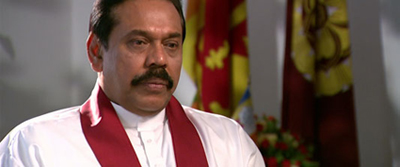
Taken from Al Jazeera
Transforming State media
Recent reports in the State media loudly proclaimed the President’s desire to depoliticise State media and his instructions to this effect. As pointed out in the Free Media Movement statement in response to the President’s comments, President Rajapakse had ‘pointed out that the government owned media should play a pivotal role in portraying the government’s development work’ and the need ‘for an effective role by the media to project the country’s situation to the international community at a time where various people were trying to tarnish the country’s image by engaging in a slanderous campaign abroad.’
I am deeply skeptical of the President’s avowed desire to reform State media. Our responsibility as journalists is to citizens, not to politicians or the Executive. The degeneracy and deeply partisan nature of State media is clearly brought out in every single report and analysis on media in Sri Lanka. We recall with disgust that the Editor of Dinamina was removed from his post because he got the President birthday wrong. Rajpal Abeynaike from the Sunday Observer was removed from his post for his criticism of the President. The Editor of Subasetha, a newspaper on astrology published by the Government owned Lake House, was removed because of the publication of a report that claimed the President was facing an inopportune time. Narada Bakmeewewa and Wasantha Dukgannarala were removed, along with their programme, from State television because they sported long-hair in a programme telecast from the President’s hometown. Bandula Padmakumara was appointed Chairperson of Lake House because the President publicly stated that he was a personal friend.
We expect this farce to continue.
A random edict from a President singularly responsible for the degeneracy of State media and the decay in media freedom isn’t going to solve anything or change anything. Surely, a politician as savvy as the President knows that actions speak louder than words? Steps needed to reform media in Sri Lanka are well-known and include, among others, the setting up on an Independent Media Commission under the Constitutional Council, expanding the ownership of Lake House on the lines of the recommendations by the Sidath Sri Nandalochana report of 1995, the setting up on an Independent Broadcasting Authority to depoliticise electronic media owned by the State and the enactment of the Right to Information legislation.
We are sick of talk and empty, false promises. Irrespective of who is in Government, these recommendations are vital foundations that can significantly transform the culture of State media and foster media freedom in Sri Lanka. Where is the political will to effect this change?
The inanity of 2 billion rupees
This President likes to put his foot in his mouth with nauseating frequency. The latest fiasco over the purported re-introduction of Criminal Defamation Laws is a case in point. Also of note is the Two Billion rupees sought in damages and legal proceedings against a newspaper that published a political analysis by Ranil Wickremesinghe that compared this President to Germany’s Hitler. Unfortunately, it seem the President has already forgotten the eviction of Tamils from Colombo already and the opprobrium it generated locally and internationally.
The cost of advice
The last part of my article deals with the cost to the Sri Lankan tax-payer of maintaining the President’s coterie of advisers. Many well-known names are on this list. Perhaps the fear of a life in poverty is what motivates them to take payment for their advice to this President.
Oh tempores! Oh mores!
For my article in full, written in Sinhala, please click here. For a PDF of the FMM’s statement on the President’s comments, please click here.
